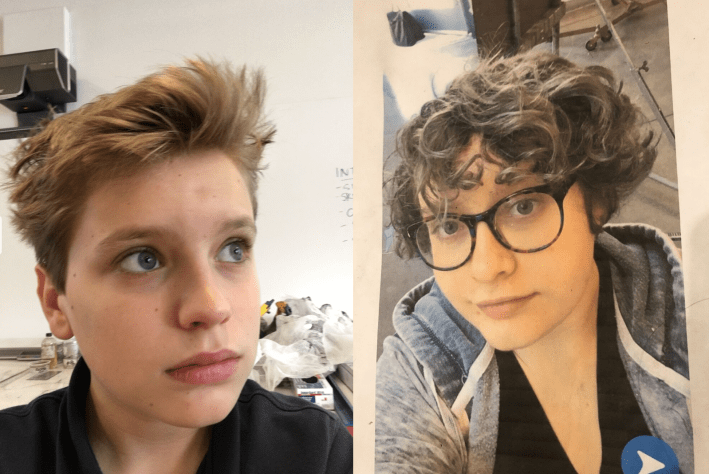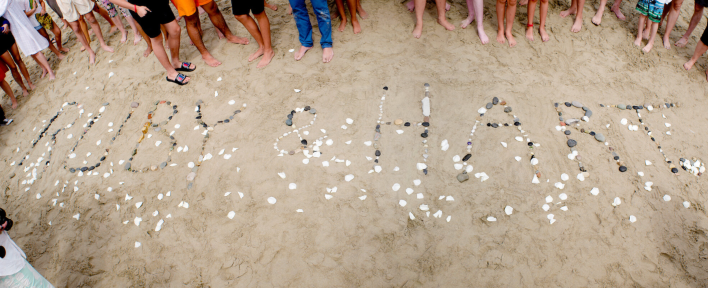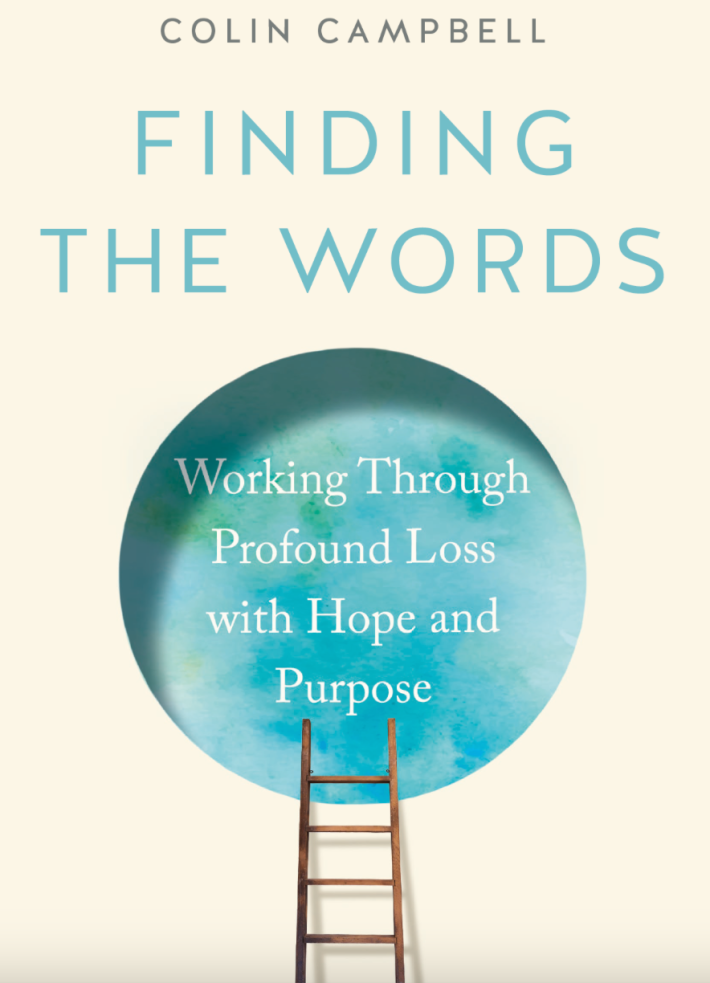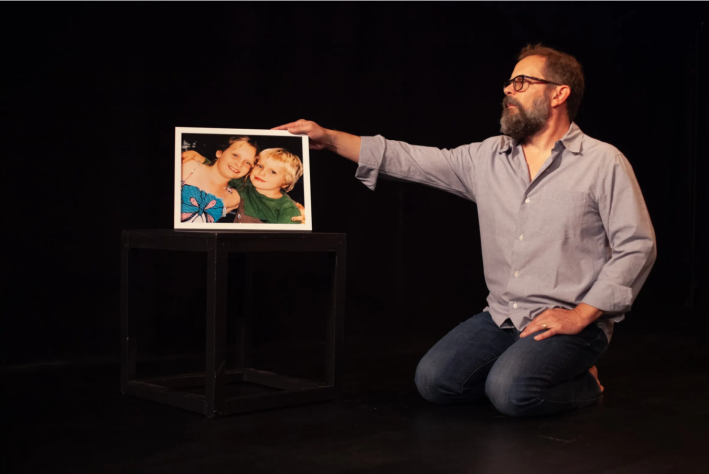On the night of June 12, 2019, filmmaker Colin Campbell was driving along the long stretch of Highway 62 between LA and Joshua Tree with his wife, writer and director Gail Lerner, and their two teenage kids in the back. Three days before, the family had spontaneously put an offer on a vacation home in the deserts of southern California — a landscape they’d come to love during their many vacations there — and they were heading back to take in another look.
The headlights of the oncoming car looked like mere pinpoints when Colin began turning into the gas station. But that vehicle was traveling at ninety miles an hour, driven by a drunk and high driver who never even hit the brakes before she T-boned the Campbells. Colin and Gail were severely injured; the couple's children, Hart, 14, and Ruby, 17, died instantly.

After their children's death, the Campbells struggled to find the support they needed to survive their pain. They had built a strong community, especially through their temple, where Hart had recently celebrated his bar mitzvah. But few of their friends seemed to know how to speak to them about their loss. Instead, over and over, they heard the same phrase repeated: “There are no words.”
Since then, Campbell has made it his mission to find the words that grievers need to hear — and the words that the friends and family who want to meaningfully support those in grief need to say. In his new play, “Grief: A One Man Sh*tshow” — which he’ll be performing live at the People’s Forum in New York City and streaming free online Oct. 4 — Campbell initially sought to channel his rage from his children's senseless deaths into an exploration of all the darkest thoughts about grieving that no one wants to acknowledge. During the writing process, though, he says the show softened and took on a more redemptive arc; it ends with the audience repeating Hart and Ruby's names, creating a sonic structure strong enough to hold the weight of their loss.

The play was completed and about to begin previews when the pandemic shut theaters down and the first performance had to be canceled. During the isolation of the pandemic, though, he found that he still had the urge to explore grief through writing, and to reach out to others who needed help.
He began to write his book, “Finding the Words: Working Through Profound Loss With Hope and Purpose” to help guide readers through the emotional states of grieving, both for the grievers and their community, who can be so afraid of saying or doing the wrong thing that they inadvertently abandon their loved ones in their grief. Neither his book nor his play are exclusively about losing a loved one to traffic violence, but both offer a glimpse into that all-too-common experience — and powerful advice for those who have endured it, or know someone who has.
The interview below has been edited for clarity and length.
Jack Teague: What do you want the world to know about Hart and Ruby?
Colin Campbell: I think that last drive captures their characters. Ruby was working on a comic—she was this amazing budding artist at age seventeen, and she was making this amazing digital comic that was exploring her suicidality and OCD that she was just coming out of. She finished the last touch on the car ride, which was her note to the reader. It said, “If this comic hits too close to home and you're feeling the same kind of feelings, please seek help. Please call a suicide hotline. I'm in a much better place now than when I was.” She drew a little face, and shortly after she finished the last page of her comic, she was killed.
At the same time, Hart was in the backseat texting Ruby, asking for dating advice about whether he should get back together with an ex-girlfriend who was now flirting with him. This sweet little brother sister exchange was the last thing that they did. It just gives you a feeling for their character and their love for each other.

JT: Tell me more about what you want readers to take away from your book.
CC: Our culture doesn't teach us to support those in grief. Out of fear, or ignorance, or discomfort, friends and family decide that those most in need want to be left alone. So many people that we've met in grief groups have given up on many of their friends and family because they were abandoned. [They] hold so much anger towards those who used to be closest to them. It seemed so sad to me.
One of my focuses in my book is to provide tools for the grievers, specifically to help them find their own words so that they're able to express their needs to their community. There's such a strange cultural force that tells us not to ask for what we need.
And yet, I think people who love somebody who is in grief want that instruction. They want [someone] to tell them, ‘What do I say to these people? How do I behave around them?’ The griever is the one who knows how they want to be supported. A big focus of my book is helping the griever find their own words, so that they can share their needs.
JT: What did you most want to hear from your community after your loss?
CC: I love hearing stories about Ruby and Hart. Or how much grief and loss they feel, because then I'm not grieving alone. We're all missing them. Isn't that beautiful, to share that loss, rather than my being all alone and feeling like the world has forgotten them?
JT: The play was written early in your grief, and focuses a lot of space on what you call those “dark and ugly places.” Why did you decide to go there?
CC: In the play, I go to ugly places where I start comparing loss and comparing different ways that kids can die and I get in the weeds. I do go on this journey, and I become more aware of the profundity of other people's grief — that I'm not so special, and that there are deeper levels of grief than I'd ever thought of. [But] it goes to a place of grace at the end.
I've been told afterwards by audience members that those dark, ugly thoughts were really helpful to them because they'd had them too. I've since come to value those dark thoughts more than I initially did. Audiences value hearing someone go through that mental journey and come out on the other side. It's a cathartic process.
There's also this shared magic quality of live theater. The audience is together, and I make space for their grief, and they just sit stock still, in silence. It's powerful, and that only happens in live theater when we're all in a room in a collective experience.

JT: Are you comfortable talking about the case against the driver? Is it ongoing?
CC: She was arrested three years ago, and the police spent a year building an airtight case with crash analysis, cameras, brake analyses, the crash site. Then she was formally charged with two counts of second-degree murder. The defense attorney has been granted as much time as they want to prepare the case, so it's ongoing. Either way, she's in jail, so that doesn't bother me.
I've seen other parents who lost children to drunk drivers agonize over all of the court hearings, and delays, and continuances, and there's a lot of suffering in that. Our strategy, conscious or not, has been not to think about it too much.
JT: What do you think would be justice for Hart and Ruby?
CC: That's a hard question for me. Gail and I worked with kids fifteen to seventeen years old in juvenile hall who were charged with murder, or armed robbery, so they had very long prison sentences. We had a lot of compassion for these kids, and didn't feel like the prison industrial complex was a great place to put them. But now we're on the other side, and we're the victims of someone's crime.
The thought of her being behind bars instead of out on the roads is comforting. However, if she were to devote her life to fighting drunk driving, that would feel like justice to me.
Tickets for the live performance of “Grief: A One Man Sh*tshow” on Oct. 4 at the People’s Forum in New York City are available now. A virtual livestream will be available to watch for free; use the same link to register. This event is sponsored by Evermore and Families for Safe Streets.
“Finding the Words: Working Through Profound Loss With Hope and Purpose” is available wherever books are sold.






